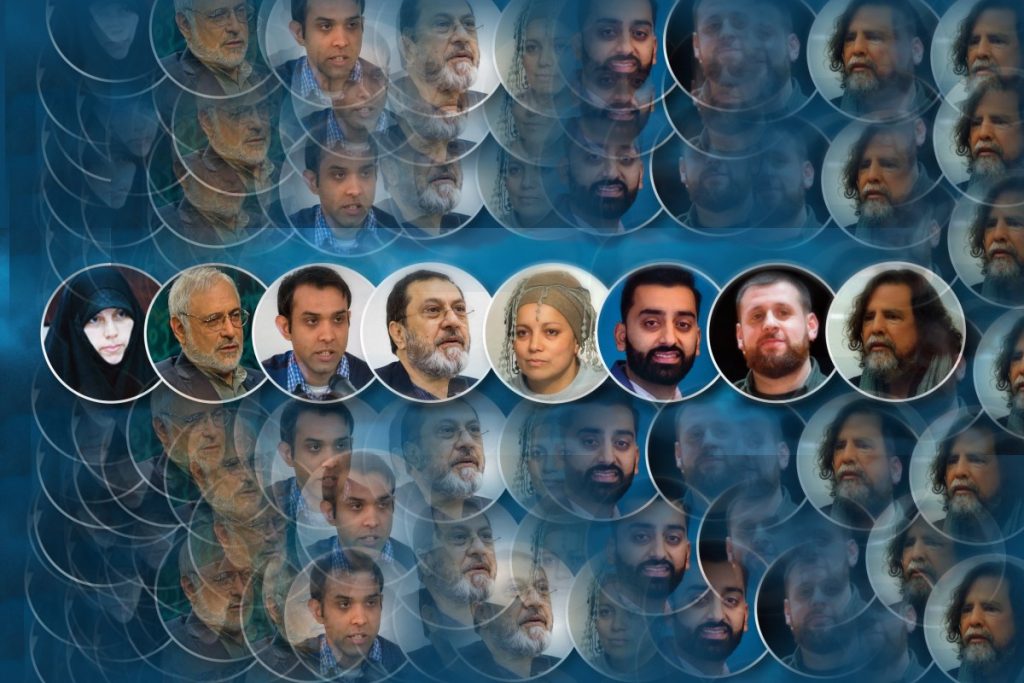IHRC hosted the seventh annual Islamophobia Conference, titled The Attacks on Civil, Human and Political Rights for Muslims in Europe, with Decolonial International Network (DIN) and Scotland Against Criminalising Communities (SACC), and supported by Decolonial Thought Community, on Saturday, 13 December 2020. Hosted by Sandew Hira (member of the board of DIN) and Nargess Moballeghi (journalist and documentary filmmaker), the event was held online on IHRC.TV, YouTube and Facebook, with over 1,500 views combined worldwide.
Sandew Hira introduced the event as a discussion of Islamophobia in two blocs, the first being Islamophobia in the context of political Islam from a theoretical perspective, and the second bloc, civil and human rights and fascism in Europe.
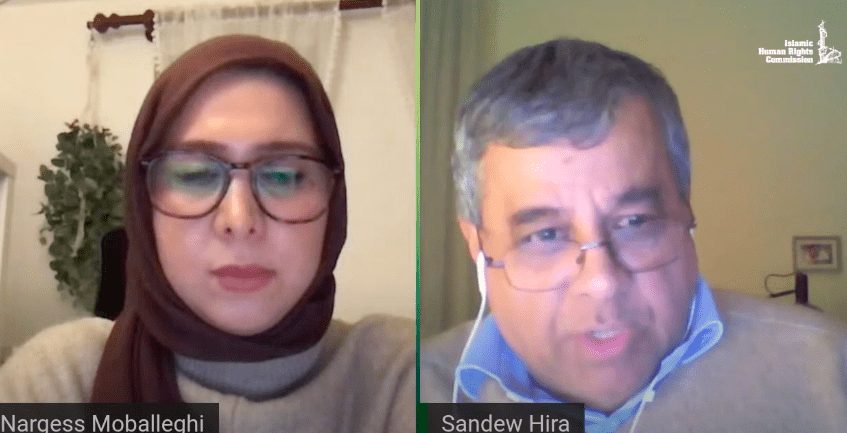
First to speak was Hakimeh Saghaye-Biria, an assistant professor at the University of Tehran, Faculty of Islamic Knowledge and Thought. She holds a Ph.D. in American Studies from the University of Tehran, a master’s degree in Mass Communication from Louisiana State University, and a Bachelor of Arts degree in Communication from the University of Houston. Saghaye-Biria is also the author of Political Islamophobia at American Policy Institutes: Battling the Power of Islamic Resistance.
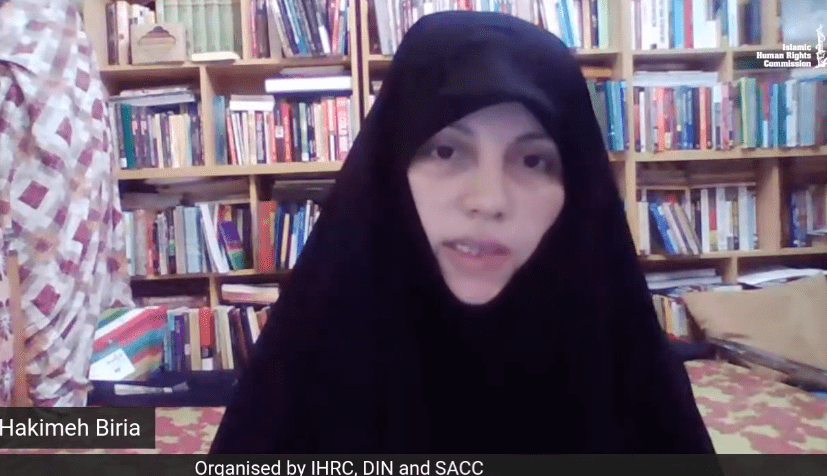
She begins her presentation on the issue of Islam and politics in Iran from the time that colonial powers encroached Iranian politics – for more than 100 years. She states colonialism made Islamic activism more important in Iran as scholars and activists saw how colonialism was taking over Iranian politics, resources and lives. As such, Muslim scholars took the lead in the fight against colonialism and wrongful politics in Iran. Colonial powers found Islam to be a source of danger to their interests in many parts of the world, including Iran and India. As a result, “colonial powers tried to find a way of making the connection between Islam and politics as something unsavoury among Muslim populations and tried to promote the separation of Islam and politics. In Imam Khomeini’s letter to Mikhail Gorbachev, he talks about the idea that religion is not the opium of the masses, because he was talking to Gorbachev at a time when he was giving certain liberties to the public of the Soviet Union. Then he says ‘how can Islam be the opium of the masses, the religion that has made Iranians as firm as mountains against superpowers.’ So, Imam Khomeini sees Islam as a source of power for Iranian against the encroachment of superpowers and talks about the connection of Islam and politics as a source of power for Muslim populations”.
Saghaye-Biria continues, “Because of this clash between Islamic politics and the colonial encroachment into lands of Muslims, colonial powers tried to promote the idea of separation of Islam and politics through the two trends that we can call Islamophobia. One of those trends is that Islam is peace and has nothing to do with politics. These trends were used to try to appease Muslims against colonial encroachment. Reverse racism was promoted in Muslim lands, with the idea that Islam was the cause of the lack of freedom and progress… It was the activism of Muslim scholars, such as Imam Khomeini, and Muslim people that worked against and overcame this reverse racism and brought forward the idea that Islam is a source of power and freedom, gave Muslims power to confront the encroachment of outside powers.”
Next to speak was Imam Al-Asi; he discusses the Qur’an as the source of Islamic reawakening and Islam self-determination. “If it wasn’t for the Qur’an, Muslims would be like creatures in the wilderness, grabbing on any ideological or philosophical straw that’s out there. There are derivatives to the Qur’an – there are verifiable and established statements of the Prophet (peace be upon him) and there are also statements attributed to him that don’t belong to him. Then there are the struggles throughout the ages by those who stood for the central theme of the Qur’an which can be capsulated as social justice. The Qur’anic message is a message of justice”.
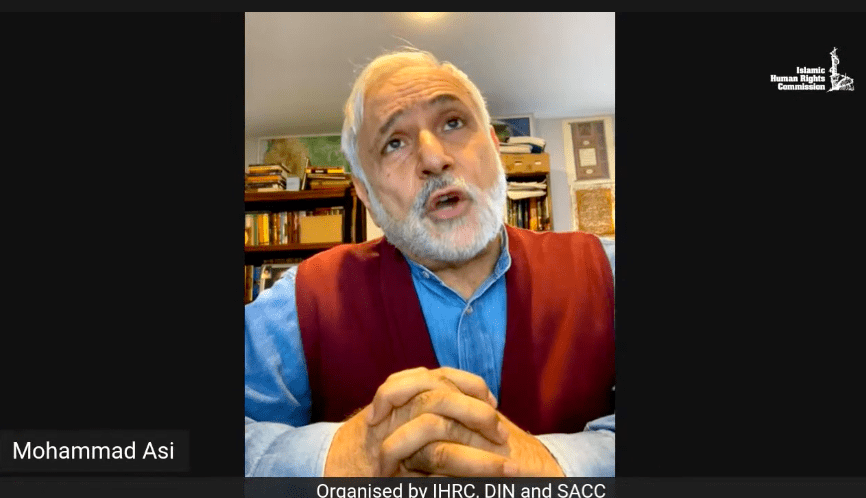
Al-Asi states that the language of the Qur’an has been dynamited in a negative sense and destroyed throughout the ages: “there are many historical reasons for this and variables that go with it, but the final result is The Quran became a book equivalent to the Judeo-biblical books of religion – they have their own histories, but all of the messengers of God had a mission to see to it that social justice becomes the way of life of all societies on earth at all times.
Those who have power and wealth, historically and contemporarily, they want to assassinate the word justice, but they cannot assassinate a concept. The next best thing to do is to assassinate those who stand for the concept of justice. Justice can be defined in many ways: those on the political left, political right and everyone in between. The Qur’an happens to be a definition of justice that comes from the creator of everyone who’s on the left, the right and in between. We have an ageless definition of social justice. What is happening in our current world affairs is that there are some people… who are beginning to rediscover the meanings of justice in their holy scripture and the rediscovery which brings with it equality and breaks down barriers of racism, nationalism and sectarianism… the lethal danger that today is playing out in the geography of the world where this Islamic reawakening to the concept of social justice is taking place, we have this particular region being targeted with warfare. The mental ammunition they had by obfuscating the social justice contents of the Qur’an, they’ve run out of mental ammunition. Mental ammunition of colonialism was exhausted, they turned to military ammunition.
There are two segments of the world that are keen on either reinstating Islam or on killing Islam off, those are the front-line Muslims on one side and other side, teaming up of Zionism and imperialism, working through proxies to defeat Islamic move for self-determination.”
Al-Asi ended his presentation by emphasising “the reinstatement of Islam is an open invitation to all the peoples of the world not to be confused with the religiosity of Islam, which has been hijacked throughout centuries by structural forces that have wealth and power at disposal to shrink Islam into a religion as is defined by them and then subject everyone else to their mindset. This is one of the obstacles in trying to have Muslims outgrow this mental cage and present Islam not in the first place as a set of rituals, but as a pursuit of justice. This is the task we are witnessing playing out in different theatres of propagandistic, psychological warfare. The source is the Qur’an – a divine message to all of humanity with one objective: social justice. The Islamic literature, scholars, activists, heroes had their legacy in the form of books, booklets and in the contemporary time, we have individuals, such as Imam Khomeini and Shariati. He also discusses Islamic Iran and evidence on how social justice can become a fact of life.”
Abed Choudhury spoke about the previous Islamophobia Conference, which was about shrinking civil society spaces; how civil society organisations are being attacked and silenced. The year before that, the Islamophobia Conference discussed Zionism and pro-Israel activism and how that related to fuelling islamophobia in the UK and Europe. Choudhury said, “the issues discussed have remained very much alive throughout 2020 and have gained increased urgency for Muslims in the UK. The IHRA continues to be pushed by Zionist activities and pro-Israel advocates and we saw the UK government education sector call on universities to adopt it. This definition and examples of anti-Semitism they provide will impact all pro-Palestine activities regardless of race, faith or background. It has a particular negative effect for Muslim activists, in the way it is utilised against them and the fact that large numbers of Muslims do support the Palestinian cause, so they will be disproportionately targeted. With this aggressive use of the IHRA definition to attack those who criticise Israel, we’re going to see professionals and students targeted for their activism. These activists will get maligned and criticised in the public sphere – we have already seen this in the cases that IHRC have worked with.
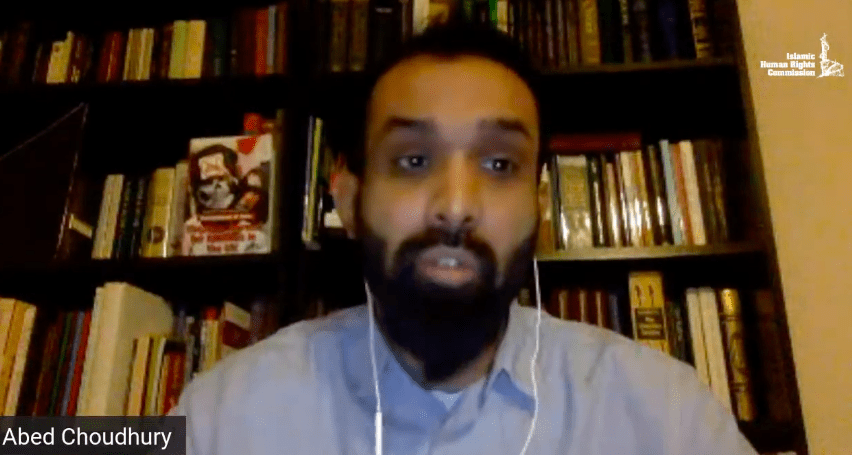
This can cause many Muslims to self-censor, or they will disengage with politics in order to avoid being targeted by employers or universities. Such outcomes would be a major victory for pro-Israel activists because it means a constituency of critics have essentially silenced themselves and disengaged with the process. Throughout 2020, it has remained an issue and it is becoming more of a problem because the government is putting greater weight on the definition itself. The IHRA definition would create a hierarchy of victimhood; one grup is given greater protection by the use of this definition above all other minorities. This lopsided situation in the long-term will undermine the definition itself. Special protection and privileges cannot be justified by offering it to one group while denying it to others. The definition will lose legitimacy among anti-racist activists and public generally, instead creating solidarity among targeted groups, we will see more division.”
He further added, “the definition itself shows when it comes to free speech, some groups have greater rights than others – something Muslims have known for a long time. For example, insulting Islam is within free speech in Europe, but Muslims protesting that politically and peacefully is presented as anti-free speech, rather than an exercise of their own political rights. This unequal distribution of rights impacts many minorities and involves a whole gamut of fundamental rights from free speech to the right to life. It important that these disparities are highlighted and how political and civil rights are enjoyed and protected, but this is not enough.
Many people across Britain and Europe know inequalities exist within the system when it comes to how fundamental rights are enjoyed. We need to seek and demand change. One of the arguments to be used for this when arguing with the majority community – because it doesn’t affect them in the short-term, but it will in the long-term. Any discriminatory law or policy may initially start off targeting a minority community but once it is law, it can be rolled out to target everyone. For example, from the inception of the Prevent policy, it was purely targeted towards the Muslim community and getting Muslims to integrate better into society. At every step, the law that the was widened and made more draconian, the discussion in the media and among political circles, it was always in the context of Muslims and Islamism. Yet, we now see that Prevent is now being used against climate change activists. A policy that was ostensibly targeting Muslims has widened to target white middle-class Britain. In trying to get equal access to rights and civil liberties is to emphasise laws and policies used to attack, curtailing rights and silencing rights of minorities can, have and will be widened to impact more groups that the govt wishes to target. The best way to stop majority groups from being targeted by these draconian laws is to stop these policies being enacted in the first place.”
Massoud Shadjareh addressed what is happening in Austria and how it fits in to this discussion. Reflecting on history, Shadjareh begins with when Muslims first reach Austria in 1529. He shares, “Muslim involvement in Austria could be highlighted in 1908 when the empire took over Bosnia and Herzegovina, which was predominantly Muslim, and therefore needs to address its involvement with the Muslim population. In 1912, a legislation was passed, accommodating and recognising Muslims as citizens and as a group of people with different needs and aspirations. The Muslim community of the empire i.e., majority Bosnian, felt their needs, aspirations and equal citizenship were considered. This is important because that is the only place in Europe that accommodated Muslims and Islam in that way.
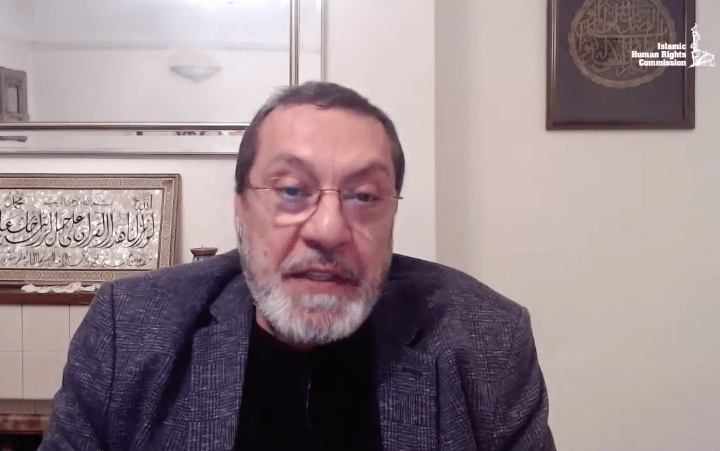
The current estimate of Muslims in Austria is around 7 million, all from different backgrounds, as well as a thriving number of reverts. When we look at the situation of islamophobia, we first turn to the 1999 a campaign with the slogan ‘stop foreign interference’, targeted primarily against Muslims in Austria. That campaign by the extreme right grew and the personality involved in this was the current chancellor Sebastian Kurz. In 2015, the 1912 legislation that was accommodating towards Muslims was turned. Muslims no longer had protection and the feeling of belonging. In 2017, another legislation against the niqab was passed, and in 2018 there was a call for a headscarf ban, but the high court was against it. What is important here is the direction of creating and promoting the notion that Muslims are no longer part of Austrian society. The chancellor Kurz is arguing to make political Islam unlawful – how is this possible? How do you separate politics and Islam when they have been part of each from the beginning and the Prophet (peace be upon him) was not only a spiritual leader, but also a political leader?”
Houria Bouteldja focused her presentation on the situation in France. Since the decapitation of Samuel Paty by a Muslim terrorist in October 2020, and the government took this opportunity to repress the Muslim community even more. “The government decided to dissolve the CCiF (Collective Against Islamophobia in France) in December 2020, which is the main anti-racist and Muslim organisation, much more than white anti-racist organisations. The government also dissolved another charity organisation, closed a few mosques and threatened to close others. There is no link between these mosques/organisations and terrorism, but the aim of the government is to charge Muslims to make them take responsibility of the phenomenon of jihadism. France is involved in the war in Iraq, Syria, Yemen and Libya. Charging Muslims means making France innocent. The phenomenon of terrorism is in the end the responsibility of Muslims.”
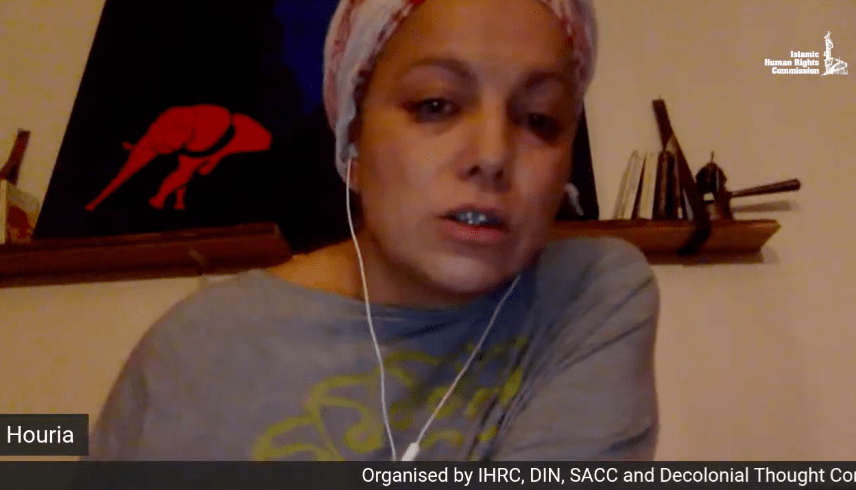
“The rage against Muslims is also due to our political progress. There is a pessimist way of analysing the development of islamophobia in France but, there is also an optimistic way of analysing the rage against Muslims. The pessimistic one is to say Muslims do not have any power in France so they cannot protect themselves, which is true. However, the optimist way is to say our struggle is progressing. CCIF was quite a powerful organisation and autonomous – they do not depend on the state. Decolonial thought is now penetrating the universities and political parties. So, we can analyse the panic of the government also as a reaction against our capacity of resisting.”
“Nevertheless, the Muslim condition in France is one of the worst in Europe. In November 2020, 3 Turkish children, around 10 years of age, were arrested and the reaction of the white left was very weak. The main anti-racist association did not say anything. There were only a few voices that protested. Furthermore, over 400 children have been singled out because they refuse observe the minute of silence for the assassinated professor. 150 complaints have been field against children accusing them of justifying terrorism. When we add that the repression of Muslims is made on the idea that freedom of speech is threatened by Muslims, you have a good idea of the way everything is reversed. Victims become the torturers… Islamophobia is negated, and anti-white racism is promoted. The debate in France that freedom of speech is threatened by Muslims is only a hypocritic offensive for the leading classes to defend and protect their own right of being racist and Islamophobic. Today, Muslims cannot escape the fact they are really treated like the indigenous during the colonial past. Muslims are condemned to be lucid of what they are in Europe. It means that now the Muslims have to get rid of dreams of becoming citizens inside French nation state. In conclusion, they have to get rid of and liberate themselves from integrationism and become decolonial. Part of our job is to develop this consciousness.”
Sheher Khan, a representative from Denk in the Netherlands, is the first party founded by POC. Denk won seats in previous national election in municipalities and provinces across Netherlands. He begins his presentation by discussing the debate in Holland “focused primarily on combating terrorism, which we support, but we also saw the backlash against Muslims in France [after the killing of Samuel Paty]. We know that the latter did not get picked up by any party in the Netherlands.”
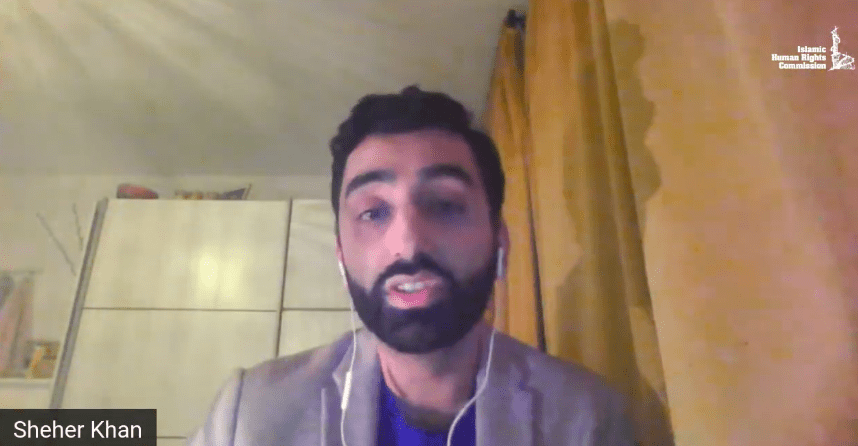
“In national parliament, my party leader, mentioned there was a petition signed by over 120,000 Muslims in reaction to the killing in which we said we condemn this violence, and we want to create a society where people have respect for each, and we also condemn all insulting against the Prophet Muhammad (PBUH). In Holland, if there are more than 40,000 signatures on an issue, the national parliament is obliged to talk about it. None of the 11 or 12 other parties in the election focused on this issue. When my party leader mentioned the signatures and asked to discuss this issue, he endured a lot of verbal violence from the far-right. We have two far-right parties in the Netherlands; the verbal violence also came from the so-called reasonable centre parties, the Christian Union and the Christian Democrats. Their responses to Denk contrasted far-right figures like Geert Wilders and far-right parties; [for example] when such parties try to propose a ban of the headscarf, they have no opinion about it. But when a party like Denk mentions the fact that 120,000 Dutch citizens signed this petition, they became furious. They did not want to talk about it at all. When Muslims try to address what is going on in the society in a peaceful and democratic manner which a lot of parties are not recognising, the response of the vast majority of other parties is to ignore it or with verbal violence.”
“There is a programme called Shelter City, an organisation for activists that are under threat in the countries they live, which gave us an opening to talk about the situation in France. We discussed the closure of CCIF and Idriss Sihamedi seeking political asylum in Turkey. We said we could not accept this and if one does not feel safe in their country, we have the Shelter City programme in the Netherlands to seek safety. When we proposed this to the mayor, she did not want to respond, and she devised an excuse so as to not discuss the issue. She stated France is not a totalitarian country, yet there is no criteria that a state has to be totalitarian to give shelter to activists that are being prosecuted or threatened by the state. On the one hand, all the parties can see the need to combat extremism, but they do not want to see the backlash against Muslims and the clamping down of human rights of Muslims.”
Our next speaker, Amanj Aziz, an anti-racist activist from Sweden, decided to withdraw from the conference. Sandew read out Aziz’s message: “Salam alaykum. When I was invited to speak at this conference and I saw the programme, I really thought that we were focusing on the Islamophobia and the escalation in Europe. I did not however sign up for praising different leaders and give simplistic images of oppressive states such as Iran… I have experiences that cannot legitimise what has been said therefore I will excuse myself from this meeting. I am especially sorry to Sandew and Massoud’.
Sandew responded by stating the principles of the Decolonial International Network on how to move forward when there are differences of opinion. Sandew stated, “when we have a discussion about a topic like political Islam, it is imperative to invite people from Iran because it is the country where the discussion of political Islam took on an international agenda”.
Furthermore, the opinions of activists from different traditions have fundamental disagreements. “We work with secular people, religious people of different faiths. We cannot exclude people from a discussion just because we don’t agree with them. We have this experience on a broad range with all of the sensitive anti-imperialist countries: Cuba, Venezuela, china, Iran, Bolivia, etc. We bring in the people who the imperialists do not want to listen to but they are entitled to their own opinion and we don’t always agree with them. In the anti-imperialist and decolonial struggle, we only can move forward if we are willing to listen to each other, bring forward our positions, and let people have their say and then, we come to our own conclusions. Sandew was apologetic to Aziz for his stance on the matter but reassured that it is within his right.
During the Q&A, speakers discussed the subject of feminism in the social justice movement, how feminism can be a tool against colonialism, racist perspectives of patriarchy, practical ways reintroducing a metaphysical framework for justice for Muslim activists as opposed to being rooted in the language and strategies of leftist and post-modernists constructs and the importance of understanding Islamophobia as a form of racism and how and why there are processes of demonising Muslims.
Lastly, we were joined by Ramón Grosfoguel. He discussed Islamophobia being present in the West and in the periphery of the West. “Wars are Islamophobic wars, clearly linked of neocolonialism. Westernised Muslim elites in Third World countries are in complicity with white supremacist imperialism, exercising Islamophobic and racist discourses against their own populations. So, Islamophobia is not just a problem of the west, it is also a problem in the so-called Muslim world because it is [part of] the West in a subordinate way. They have been successful in putting in place, westernised Muslim elites that have Muslim identities, but they work for the Western empires. We have to be opposed to any interventions in Third World countries by Western imperialism, even if we don’t agree with the politics of the countries. We cannot condition our support while we struggle against imperialist aggression.”
Watch the full conference:
Thank you to the supporting organisations, IHRC, DIN, SACC and Decolonial Thought Community.

